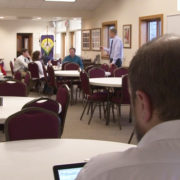For people
John A. Braun
Confessional Lutherans are principle and concept people. They talk in language that reflects their perspectives—and think in that way too. I confess to be one of them. I have learned the language through my training, and I also have learned to treasure its precision and value.
I can discuss concepts of law and gospel and treasured concepts with others who share the same beliefs and the same language. But that discussion does not connect with those who do not share my confessional Lutheran vocabulary. Words like incarnation, justification, conversion, real presence, close communion, good works, and redemption require a glossary or dictionary for many. Almost the entire list of confessional Lutheran concepts doesn’t resonate with people who haven’t learned the language and the concepts.
Sometimes I wonder if we are guilty of only speaking to the choir when we try to share our faith. Of course, on issues of doctrine we want to be right and precise. It is important for us to adhere to the truths God has revealed to us and we have grown to treasure. But when we share those truths with others outside of confessional Lutheranism, there’s a danger that, as they listen, their eyes will take on a distant glaze of disinterest. We want to talk doctrine, but they have absolutely no interest in the concepts, distinctions, and what they consider the “fine print.”
So how do we make connections with those outside the sphere of our language of comfort and familiarity? I’d suggest two principles that I think are important. The first is that we live our faith and show what Christianity means to us. Jesus suggested this approach when he said, “Let your light shine before others, that they may see your good deeds and glorify your Father in heaven” (Matthew 5:16).
But we don’t always live as we should, and neither do other Christians. That too is an opportunity to show forgiveness, support, and understanding. On some occasions, the temptation is to become quite self-righteous—a definite turn off to others! Peter suggests that gentleness and respect (1 Peter 3:16) can temper the temptation. And a little humility goes a long way.
The second way is to avoid getting dragged into a discussion of doctrine and what we are against. All the doctrines we treasure are for us and for all other people. A discussion of Christ’s incarnation may bring up proof passages, what our church teaches, and what’s wrong with the teaching of others. But there may be an opportunity to focus on the importance of that doctrine for people—like you, me, and all others.
Jesus became flesh, that is, he was incarnated, to take our place. He loved us enough to come here to rescue us from our own failures and sins.
Talking about justification also provides an opportunity to do more than repeat the Lutheran language of grace and faith. Simply direct your attention to what it means to people like you and those who know you. Then justification becomes clear to others. It is simply shorthand for saying that we cannot be good enough for God by our own efforts. Yet God sent Jesus to overcome sin and death and declare us right and good in his eyes. Faith accepts God’s undeserved gift.
The entire body of doctrine has Jesus at its core and the people of this world as the target audience. It’s hard work finding the spot to apply Jesus to the wounds and pain of another person, but he is the healing balm for all people. We will stumble, but the Holy Spirit promises to use our awkward, sometimes bumbling, efforts to share Jesus with people.
SUBMIT YOUR STORY
Do you have a manuscript, idea, or story from your own life you’d like to share for use in Forward in Christ or on wels.net? Use our online form to share it to our editorial office for consideration.
SUBSCRIBE TO FORWARD IN CHRIST
Get inspirational stories, spiritual help, and synod news from Forward in Christ every month. Print and digital subscriptions are available from Northwestern Publishing House.
Author: John A. Braun
Volume 103, Number 6
Issue: June 2016
Copyrighted by WELS Forward in Christ © 2021
Forward in Christ grants permission for any original article (not a reprint) to be printed for use in a WELS church, school, or organization, provided that it is distributed free and indicate Forward in Christ as the source. Images may not be reproduced except in the context of its article. Contact us







